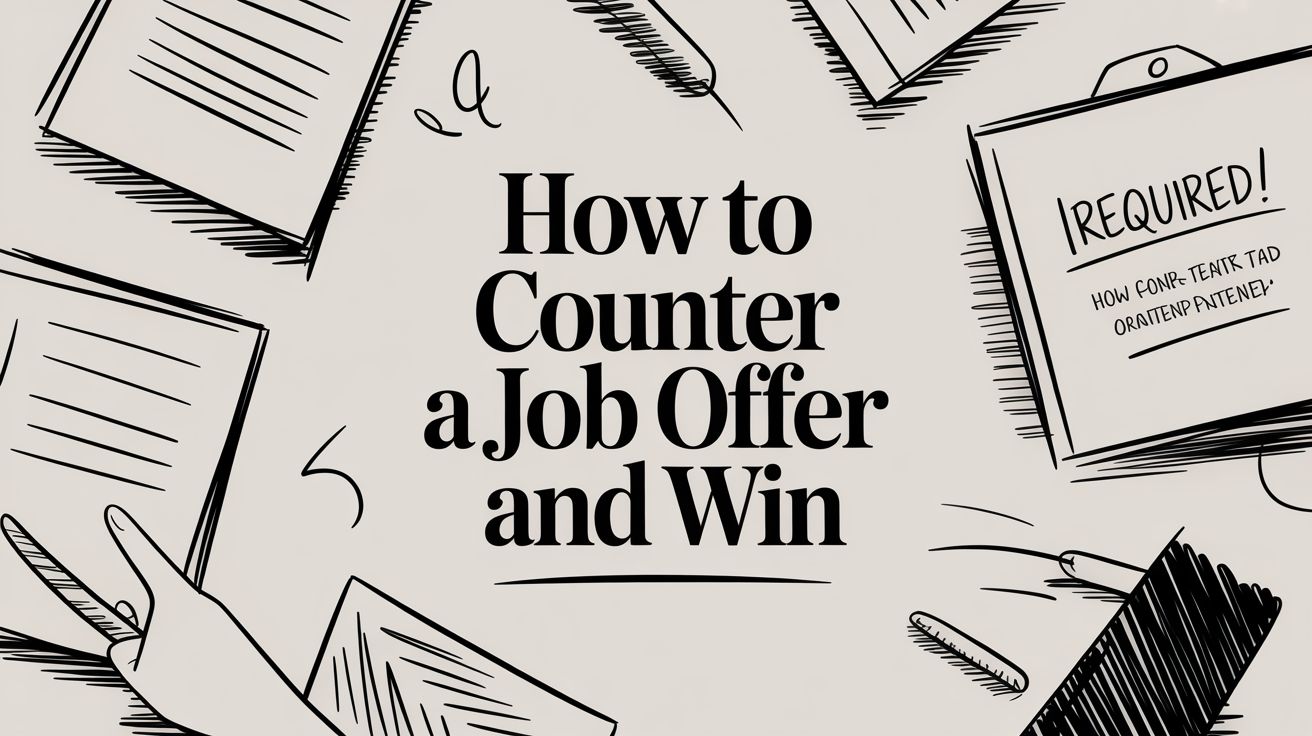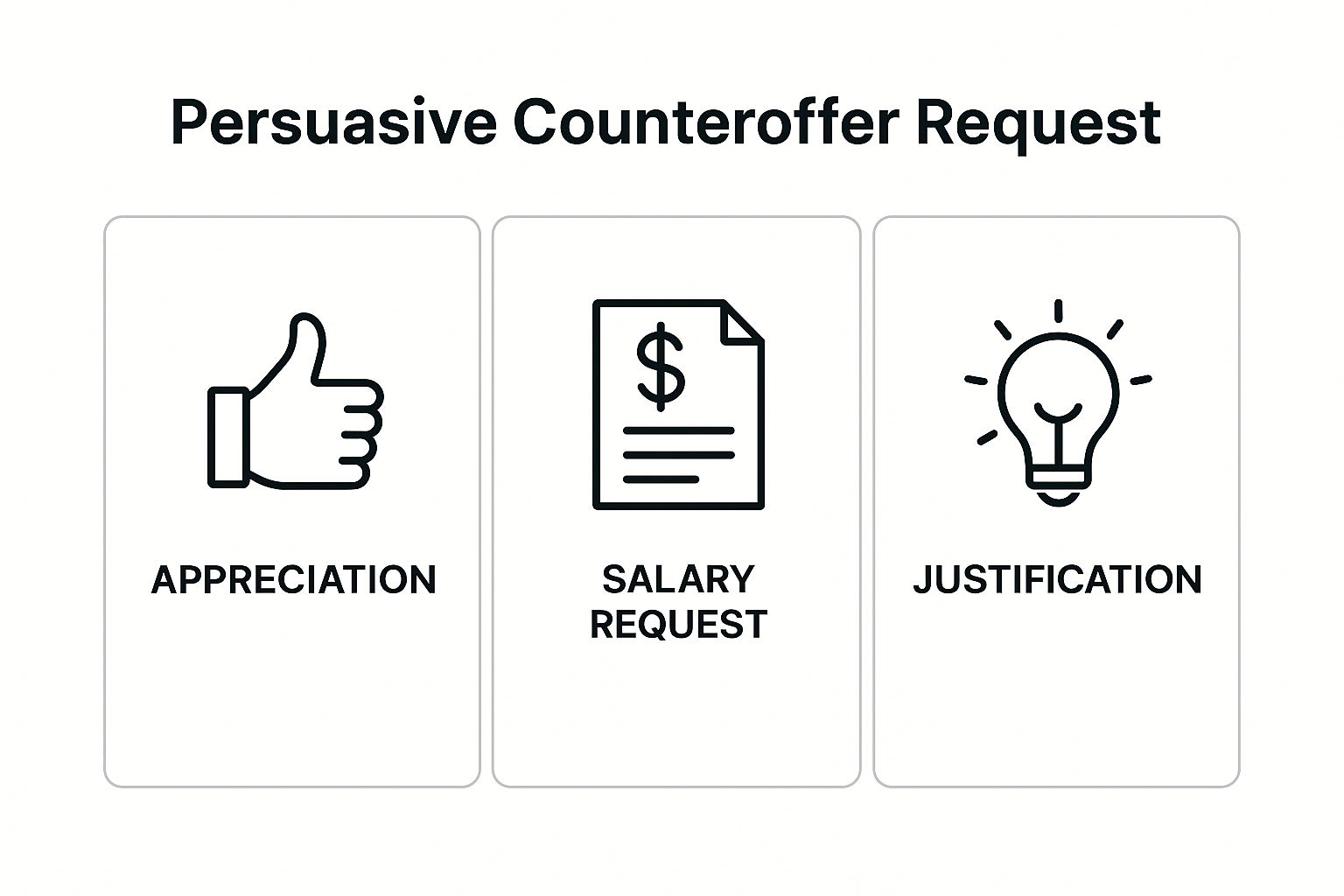How to Counter a Job Offer and Win

You’ve done it. You navigated the resumes, aced the interviews, and now a job offer is sitting in your inbox. It’s a huge win, but remember—that first number is rarely the final number. To successfully counter a job offer, you need to approach it like any other business discussion, not a confrontation. It’s all about calmly assessing their offer against your proven market value.
Knowing When to Counter a Job Offer

It's natural to hesitate. So many professionals worry about seeming greedy or, even worse, having the offer pulled. But the truth is, most companies fully expect you to negotiate. A well-researched, professional counteroffer doesn't make you look greedy; it shows you know your worth and can advocate for yourself—qualities every manager wants on their team.
Think of their initial offer as an opening bid. Hiring managers often have a salary band for a role and usually start somewhere in the middle, leaving room for a great candidate to ask for more. This is particularly true if they made an offer quickly or gave you a very wide salary range at the beginning of the process.
Spotting the Green Lights for Negotiation
Sometimes, the company practically invites you to negotiate. Did the offer come through faster than expected? They might be trying to lock you down before other offers come in. Is the language around bonuses or benefits a little vague? That’s your opening to ask for more clarity and better terms.
But your decision to counter shouldn't be based on a hunch alone. It needs to be backed by solid data. Before you do anything, ask yourself how the offer stacks up against:
- Your Market Value: How does the salary compare to industry benchmarks for your specific role, years of experience, and city? You can explore how pay differs based on your professional location to get a really accurate picture.
- Your Career Goals: Does the title move you forward? Will you gain specific, valuable experience that aligns with your long-term plan? Sometimes, a slightly lower salary is worth it for a major career boost.
- The Total Compensation Package: Don't get fixated on just the base salary. You have to look at the whole picture—bonuses, stock options, health insurance quality, 401(k) match, and paid time off.
To help you decide, run the offer through this quick checklist.
Initial Offer Assessment Checklist
This table is a simple framework to help you gauge whether countering is the right move. If you find yourself checking off more "Counter" signals than "Accept" signals, it's time to prepare your negotiation.
| Assessment Area | What to Look For | Action Signal |
|---|---|---|
| Market Data Alignment | Is the salary below the 50th percentile for your role, location, and experience? | Counter: If data shows you're worth more. |
| Total Compensation | Are benefits like healthcare, PTO, or bonus potential weaker than expected? | Counter: Ask for improvements to the whole package. |
| Company's Eagerness | Did they make the offer very quickly or express strong interest in hiring you? | Counter: You likely have leverage. |
| Vague Offer Details | Are performance bonus structures or career progression paths unclear? | Counter: Seek clarity and specific commitments. |
| Personal Needs | Does the offer meet your financial requirements and long-term career goals? | Accept/Counter: Depends entirely on your personal situation. |
| Company Policy | Does the company have a known, rigid salary band structure? | Accept: If the offer is at the top of a transparent, non-negotiable band. |
Ultimately, this checklist should give you the confidence to either accept a great offer or strategically push for a better one.
When It Makes Sense to Accept the First Offer
While it's usually smart to negotiate, there are times when accepting the initial offer is the right call. If the package comes in well above your expectations and beats all the market data you’ve gathered, you might not need to push. This is also true for companies with a stated policy of transparent, non-negotiable salary levels for all roles.
Negotiation is a standard part of a healthy job market. In the United States, about one in five candidates (21%) declines a job offer. This results in an offer acceptance rate of just 79%—the lowest among major global markets. This is a sharp contrast to industries like manufacturing, where acceptance rates hover around a much higher 92%.
Building Your Case with Market Data

A successful counteroffer isn't built on what you feel you deserve. It’s built on what the market proves you’re worth. When you walk into a negotiation with objective, hard data, you fundamentally change the conversation. Your request is no longer a personal plea; it becomes a logical business case that’s much harder for a hiring manager to dismiss.
Think of it as building a personal compensation benchmark. This goes way beyond plugging a title into a generic salary website. You're painting a complete picture of your value, one that accounts for your specific role, industry, city, and unique qualifications.
Going Deeper Than Generic Salary Averages
The real power lies in getting hyper-specific. A title like "Marketing Manager" can mean a dozen different things with wildly different pay scales. You need to gather data points that mirror your exact professional profile to make your argument compelling.
Your research needs to zero in on compensation for:
- Your exact title and seniority. A "Senior SEO Specialist" and an "SEO Manager" are not the same, and their market rates reflect that.
- Your specific industry. A communications role at a tech startup is going to be benchmarked differently than the same role at a large nonprofit.
- Your geographic location. A salary in San Francisco simply isn't comparable to one in St. Louis.
- Company size and stage. Compensation structures often look very different between a massive corporation and a fast-growing startup.
When you nail down this level of detail, you're not just guessing—you're building an undeniable foundation for your negotiation.
Quantifying Your Unique Value
Market data gives you the salary range, but your unique skills and proven accomplishments are what justify a number at the top of that range. This is where you connect the dots for the hiring manager and show them precisely why you aren't just an average candidate.
Think about how you can put a value on these factors:
- Specialized Skills: Are you certified in a high-demand software platform? Do you have deep expertise in a niche area like technical PR? These are tangible assets.
- Advanced Education: A master's degree or a specialized postgraduate qualification can absolutely command a premium in many fields.
- Measurable Achievements: Don't just say you're good at your job. Prove it. Did you grow organic traffic by 40%? Did you manage a $2 million ad budget effectively? Use hard numbers.
Your counteroffer shouldn't just state a number—it needs to tell the story behind it. You have to clearly articulate why your specific skills and proven track record align with the compensation you’re requesting.
Assembling the Total Compensation Picture
Finally, never forget that base salary is just one piece of the puzzle. A truly comprehensive benchmark has to account for the entire benefits package. An offer with a slightly lower base salary but phenomenal healthcare, a generous 401(k) match, and flexible PTO might be far more valuable than a higher salary with lackluster benefits.
Do the math. Assign a monetary value to these components where you can. For example, calculate the annual dollar value of the company's 401(k) match or the out-of-pocket savings from a top-tier health plan. Understanding how salary data platforms work can give you a much clearer sense of how base pay, bonuses, and equity are weighted in your field.
This complete financial picture ensures you counter with a request that reflects the offer's true, total worth.
How to Frame Your Counteroffer Request
Alright, you've done your homework and have the market data in hand. Now comes the critical part: actually delivering the counteroffer. The way you frame this conversation—whether it's an email or a call—is just as important as the numbers themselves.
Your goal here is to be collaborative, not confrontational. Think of it less as a demand and more as the start of a business discussion about your value. This positions you as a strategic partner who knows their worth, not just someone asking for more money.
Start with Genuine Excitement
Before you get into the numbers, always lead with genuine appreciation and enthusiasm. This is key. It immediately reminds the hiring manager that you want this job and sets a positive, collaborative tone for what’s coming next.
Don't just say you're excited; mention why. Was it the team, the projects you discussed, the company culture?
Here’s an example of how that might sound:
"Thank you so much for the offer to join the team as the new SEO Manager. I was incredibly impressed by the team's data-driven culture during my interviews, and I'm very excited about the opportunity to contribute to the company's growth."
This kind of opening makes it clear that your counter is about finding the right fit on compensation, not a lack of interest in the role itself.
State Your Counteroffer Clearly and Confidently
Once you’ve set a positive tone, it's time to pivot to your request. The most common mistake people make here is sounding apologetic. Ditch phrases like "I was hoping for a little more" or "I'm sorry to ask."
Be polite but direct. You've done the research, so state your number with confidence. A simple transition is all you need. For instance: "After reviewing the complete compensation package and comparing it with market data for similar roles, I would be thrilled to accept if you could adjust the base salary to $98,000."
This infographic breaks down the three essential pillars of a strong counteroffer.

Framing it this way makes your request feel like a well-reasoned business proposal, not just a personal ask.
Justify Your Request with Data
This is where your research becomes your best friend. You need to show them the "why" behind your number. Briefly present the data that backs up your counteroffer. This anchors your request in reality and demonstrates that your desired salary is both logical and fair.
It's not about what you want; it's about what the market values for your specific skills and experience.
You could phrase it like this:
- "Based on my research into compensation for senior marketing roles in the SaaS industry in Austin, a salary in the range of $95,000 to $105,000 is typical for a candidate with my level of experience."
- "The data I've gathered indicates that my skill set, particularly my experience in managing seven-figure ad budgets, aligns with the upper end of the pay scale for this position."
Leaning on data removes emotion from the negotiation. Economists have noted a growing gap between what employers offer and what candidates expect, and solid data is the best way to bridge it. With the global unemployment rate at a low 4.9%, a staggering 92% of hiring managers still expect recruiting to be a challenge. This means top talent—people who have done their homework—have real leverage.
No matter how the conversation goes, always end on a high note. Reiterate your excitement about the role and express confidence that you can find a solution that works for everyone. This reinforces your desire to join the team and keeps the door wide open for a great outcome.
Navigating the Negotiation Conversation

Alright, you’ve sent your thoughtful, data-backed counteroffer. Now comes the hard part: the wait. The silence can feel deafening, but this is a standard part of the dance. How you handle the back-and-forth that follows is just as critical as the initial number you put on the table.
The key here is to stay cool, listen intently, and be ready to transform a potentially tense exchange into a collaborative problem-solving session. Remember, the ultimate goal isn’t just about securing a higher salary. It’s about reaching a mutual agreement where both you and the company feel valued and respected.
Understanding Their Response
Once the hiring manager or recruiter circles back, their response will typically fall into one of three buckets: a quick "yes," a firm "no," or a request for more information. A speedy "yes" is amazing—take the win and make sure you get the updated offer in writing. But what happens when the answer is less clear-cut?
This is the moment to put your active listening skills to work. If they tell you they can’t meet your number, your next move is to gently uncover the "why" behind their decision.
- Is the team working with a strict, predetermined budget?
- Are they bound by internal equity policies or salary bands?
- Do they need to maintain parity with other team members in similar roles?
Asking open-ended, non-confrontational questions can help reveal their constraints. You could try something like, "I appreciate you looking into this for me. It would be helpful for me to understand—is the salary range tied to the budget for this specific role, or is it more of a company-wide policy?" This simple question opens the door to a much more transparent conversation.
Keep in mind that your ability to counter a job offer is heavily influenced by the broader economic climate. In the tech world, for instance, recent layoffs have really shifted negotiation dynamics. With over 50,000 tech jobs cut globally in early 2025, some companies might feel they have the upper hand. Digging into the latest global hiring trends analysis can give you a realistic picture of how market shifts might play out in your conversation.
When the Salary Can’t Budge
So, what do you do if they come back and say their initial offer is truly their best and final one? Don’t assume it's a dead end. If they can't move on base pay, this is the perfect time to pivot the discussion toward other valuable parts of the total compensation package.
This is your opportunity to show you’re flexible and genuinely interested in finding a path forward. Come prepared with a prioritized list of alternatives.
For example, you could shift the focus by saying: "I understand the constraints on the base salary. Given that, could we explore other ways to make the overall package work? I'm particularly interested in..."
- A Sign-On Bonus: This is often a one-time payment pulled from a different budget, and it can help make up for a lower base salary in your first year.
- Extra Vacation Days: More paid time off has a tangible impact on work-life balance and is often an easier "give" for a company.
- A Professional Development Stipend: Asking for a budget for courses, certifications, or conferences demonstrates your long-term commitment to growing with the company.
- An Earlier Performance Review: Suggesting a salary review after six months, rather than the standard year, shows you're confident you can prove your value quickly.
By shifting the conversation, you’re not just negotiating; you’re showcasing your skills as a creative problem-solver. That's a trait every employer wants. The trick is to maintain a positive, collaborative tone, framing the dialogue around finding a win-win solution, not just clinging to your original number.
To help you prepare, let's walk through some common responses you might hear from a hiring manager and how you can strategically reply.
Common Employer Responses and How to Reply
| Employer Response | Your Strategic Reply | Key Objective |
|---|---|---|
| "This is our best and final offer on salary." | "I understand. Since the base salary is firm, could we discuss a one-time sign-on bonus to help bridge the gap?" | Pivot to non-salary compensation without being confrontational. |
| "We need to keep salaries equitable with the current team." | "That makes perfect sense. Based on my research for roles with [X specific skill/experience], the market rate is closer to [Your Number]. Could we look at the total compensation, including performance bonuses?" | Re-anchor the conversation to your specific value and market data, not just internal roles. |
| "Why do you feel you deserve this higher salary?" | "Thank you for asking. Based on my experience in [Skill A] and my track record of delivering [Result B], along with market data from sources like [Source], I believe this figure aligns my value with the role's expectations." | Confidently restate your value proposition, backed by evidence and research. |
| "I'll have to check with my manager/HR and get back to you." | "Of course, I appreciate you looking into it. Would it be helpful if I sent over a brief summary of the market data I referenced? When would be a good time to follow up?" | Be helpful, professional, and establish a clear timeline for the next step. |
Having these kinds of replies in your back pocket helps you stay composed and focused on the goal: reaching an agreement that works for everyone.
Getting Your Final Offer in Writing
You did it. You went back and forth, you made your case, and you got a verbal "yes" to your new terms. It’s a huge moment, but don't pop the champagne just yet. Your job isn't quite finished.
A verbal agreement is fantastic, but it's not a contract. The final, most crucial step in any successful counteroffer is getting every single detail down in a revised, formal offer letter.
Until you have that updated document in your hands (or inbox), nothing is set in stone. This written confirmation is your safety net—it protects you and the employer by making sure there are no fuzzy memories or misunderstandings about the terms you both agreed to. It solidifies your new compensation and prevents any awkward surprises on day one.
Don't Just Skim—Scrutinize the New Offer
When the revised offer letter finally arrives, it’s tempting to just scan for the new salary number and hit reply. Resist that urge. You need to review this document with a fine-toothed comb.
Go through it line by line and check every single detail you negotiated to ensure it perfectly matches your verbal agreement.
Here's what I always tell people to look for:
- Base Salary: Is the number exactly what you agreed on? No rounding errors, no typos.
- Bonuses: Are the sign-on bonus and any performance bonus structures clearly defined and accurate?
- Job Title: Is your title correct? This can impact your career trajectory, so make sure it's what you expect.
- Start Date: Is the agreed-upon start date listed?
- Work Arrangements: If you negotiated remote days or a hybrid schedule, is that spelled out clearly in the letter? Don't rely on a handshake for this.
- Extra Perks: What about that extra week of PTO or the professional development stipend you asked for? Make sure those are included.
I can't stress this enough: getting everything in writing is the most critical part of the negotiation. A verbal promise can be forgotten or misinterpreted. A written offer is a binding document that lays the foundation for your entire employment.
What if There's a Mistake or a Delay?
So, what happens if the offer is slow to arrive, or worse, it comes through with the wrong numbers? First, don't panic. Delays are common—sometimes things get stuck in HR or need one last signature. And mistakes are usually just that: honest mistakes.
If a couple of business days have gone by without a word, it’s perfectly fine to send a polite nudge. Keep it short and friendly. Something like: "Hi [Hiring Manager Name], just wanted to check in on the revised offer letter. I'm really excited to review it! Please let me know if there's anything you need from my end."
If the letter arrives but a detail is wrong, address it immediately but professionally. You don’t want to sound accusatory. Instead, frame it as a simple clarification.
For example: "Thanks so much for sending this over! Everything looks great, but I did notice the base salary was listed as [Incorrect Number] instead of the [Correct Number] we had discussed. Could we get that updated?" This approach is non-confrontational and almost always gets a quick, painless correction.
Answering Those Last-Minute Negotiation Questions
Even with a perfect plan in hand, it's completely normal to have a few nagging questions pop up right before you make the call. The moments before you counter a job offer are a mix of excitement and straight-up nerves. Let's walk through the most common questions I hear from professionals at this stage, so you can move forward with confidence.
What If They Pull the Offer?
This is the big one. It's the number one fear that keeps talented people from negotiating and leaving money on the table.
Let me be direct: while it’s possible for a company to rescind an offer, it is incredibly rare.
Think about it from their side. They've just spent weeks, maybe months, finding you. They've poured time and money into the recruitment process—sourcing, screening, interviewing, and getting internal approvals. Pulling your offer means throwing all that away and starting from scratch. That's a huge headache they want to avoid.
A polite, professional counteroffer backed by market data isn't a red flag; it's a standard part of business. The only time you're truly at risk is if you're rude, unprofessional, or make a completely outrageous demand with no justification. As long as your approach is collaborative and grounded in reality, the absolute worst that usually happens is they say, "Sorry, this is our best and final offer."
What Else Is on the Table Besides Salary?
Sometimes, you'll hear the dreaded phrase: "Our salary bands are firm." Don't panic. This isn't the end of the conversation—it's just a signal to pivot. Your total compensation is a package, and base pay is only one piece of the puzzle.
If they can't move on the base salary, it's time to get creative. Before you even have the conversation, you should have a list of other things you'd be happy with.
Consider asking for things like:
- A sign-on bonus: This is a fantastic way to bridge a first-year gap without changing their base salary structure.
- A guaranteed performance bonus: Shift the bonus from a vague "discretionary" perk to a concrete, committed number.
- An early salary review: Ask for a performance and compensation review at six months instead of the standard year.
- More vacation days: An extra week of PTO can be just as valuable as a small pay bump.
- A professional development stipend: Get them to commit a dedicated budget for courses, certifications, or conferences you want to attend.
- Equity or stock options: If it's a startup or public company, this can have huge long-term value.
- Relocation assistance: If you’re moving, a relocation package can save you thousands.
The goal here is to find a win-win. When you show flexibility by exploring other options, you're not just negotiating; you're demonstrating your ability to be a creative, collaborative problem-solver. It’s a great first impression to make.
How Quickly Should I Respond?
Timing is everything. Rush your response, and you might seem impulsive or unprepared. Wait too long, and you risk looking unenthusiastic or like you're juggling other offers.
The ideal window is 24 to 48 hours. This gives you a solid business day or two to digest the offer, double-check your research, and put together a thoughtful, well-reasoned counter.
Here’s a pro tip: when you first get the offer, send a quick, gracious email acknowledging it. Something simple like, "Thank you so much for the offer! I'm very excited to review it in detail and will get back to you by the end of the day tomorrow." This immediately sets a professional tone, buys you time, and lets them know exactly when to expect your response. No stress, no games.
Ready to build your case with undeniable data? SalaryGuide gives you instant access to thousands of verified salaries from marketing, SEO, and PR professionals. Stop guessing and start negotiating with the confidence that comes from knowing your true market worth. Explore verified salary data on salaryguide.com and secure the compensation you deserve.